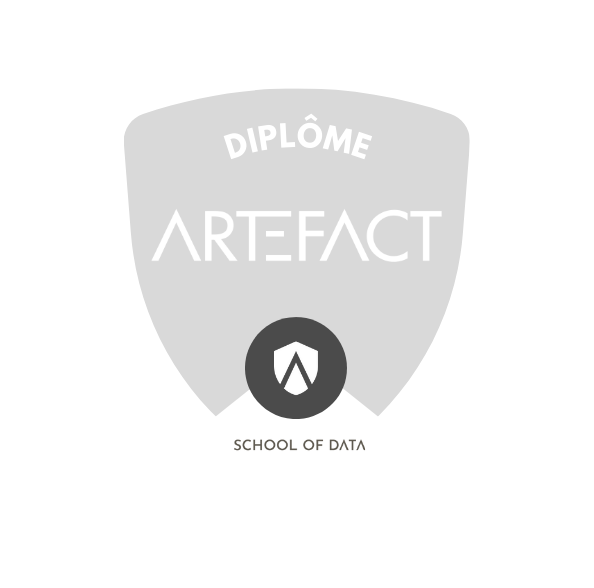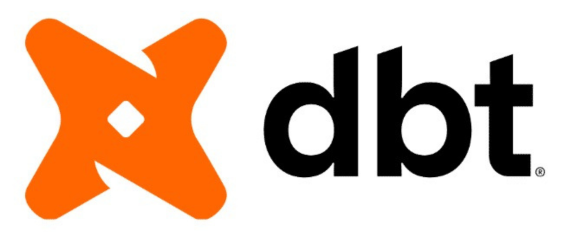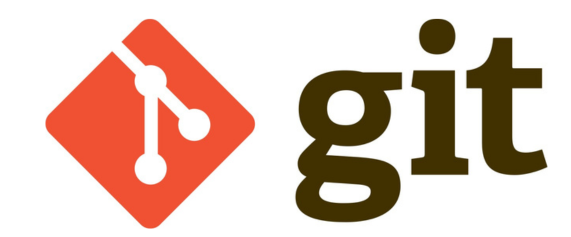Powered by ARTEFACT
Bootcamp
Data Science & AI
- +5000 Alumni worldwide
- 83% Professional integration rate after 6 months
- +500 Partner companies
Our 3 next training sessions
|
Remaining places |
Format |
Time |
Dates |
|
|---|---|---|---|---|
|
8
|
Hybride - Paris
|
10 weeks - Full-time
|
06/04/2026 -> 06/04/2026
|
|
|
12
|
Hybride - Paris
|
10 weeks - Full-time
|
06/07/2026 -> 11/09/2026
|
|
|
20
|
Hybride - Paris
|
10 weeks - Full-time
|
26/10/2026 -> 01/01/2027
|
Bootcamp
About you
Data Science & AI
Career courses
remaining space
from at
Thank you for your application.
Next steps
Choose your session
Receive our detailed programme by email:
Master the fundamental skills of Data Science
Program Data Science Bootcamp
Module 1
Data Architecture & Quality
Module 2
Visual Data Science & Business Intelligence
Module 3
Python For Data Science
Module 4
Data Collection
Module 5
Data Analysis
Module 6
Supervised Machine Learning
Module 7
Unsupervised Machine Learning
Module 8
Deep Learning
Module 9
Generative AI & Industrialisation
Module 10
ML Engineering
1 week
Structure your sources and make them reliable
➜ Mastery of complex queries, windowing and optimisation on BigQuery
➜ Transform raw data into tables ready for analysis via dbt
➜ Automated lineage and consistency data testing
1 week
Prototype and communicate your insights
➜ Accelerate data preparation and idea testing without coding using Dataiku
➜ Training of reference models via AutoML and benchmarking to validate project feasibility
➜ Data storytelling and creating actionable dashboards in Power BI
1 week
Master the most popular language
➜ Python programming basics and working environment
➜ Structuring data in Python
➜ Statistics for data science
➜ Object-oriented programming
1 week
Handle different data sources
➜ Introduction to web scraping and the use of APIs for data collection.
➜ Working with structured and unstructured data formats (e.g. CSV, JSON, XML)
➜ Introduction to SQL and database concepts (e.g. normalisation, indexing).
➜ Use SQL databases (e.g. MySQL, PostgreSQL)
1 week
Visualise and manipulate data
➜ Data sourcing from files, web scraping or APIs
➜ Handling data with Python, Pandas and Numpy
➜ Querying/storing data with SQL and Google Big Query
➜ Visualisation with Jupyter Notebook, Matplotlib, Seaborn and Plotly
➜ EDA methodology
2 weeks
Your first predictive models
➜ Supervised learning algorithms (classification, regression)
➜ Assembly methods (random forest, boosting)
➜ Recommendation system
➜ Unfolding a machine learning project (data preparation, performance measurement, hyperparameter optimization, overlearning management, cross-validation and regularization)
1 week
Your first predictive models
➜ Unsupervised learning algorithms
➜ Clustering models (DBSCAN,Kmeans)
➜ Data reduction model (PCA, T-Sne)
➜ Automated detection of statistical anomalies
1 week
Developing neural networks
➜ Neural network architectures (multilayer perceptron, convolutional neural networks, recurrent neural networks)
➜ Deep learning applications (computer vision, natural language processing, generation)
➜ Advanced deep learning techniques (transfer learning, reinforcement learning, transformers)
1 week
From robust code to autonomous agents
➜ Develop robust code in accordance with the principles of Clean Code and design patterns
➜ Automate model testing and deployment via CI/CD pipelines
➜ Containerise applications with Docker to guarantee portability
➜ Designing autonomous agents capable of using third-party tools
➜ Designing autonomous agents capable of interacting effectively with third-party tools
1 week
Working with massive data
➜ Creating and using Docker containers for your applications.
➜ Orchestrate container deployment on server clusters with Kubernetes and with Kubeflow.
➜ Google Cloud Platform, Amazon Web Services or Microsoft Azure cloud deployment
➜ Building distributed computing architectures for processing massive volumes of data (Hadoop, Spark).
➜ MLOps: versioning, packaging, testing, monitoring and lifecycle
Skills
✔ Create a dbt pipeline that automatically generates input variables for your models
✔ Structuring BigQuery queries to extract representative samples at lower cost
✔ Move the complex cleaning logic from the Python notebook to robust, versioned SQL models
Skills
✔ Go from a raw dataset to an initial working predictive model in record time
✔ Structuring BigQuery queries to extract representative samples at lower cost
✔ Use visual tools to validate data quality before embarking on heavy Python development
Skills
✔ Designing real programs in Python on your computer
✔ Managing data types and structures, program flow, functions and object-oriented programming
✔ Handling and cleaning datasets
Skills
✔ Understanding data collection methods
✔ Be able to work with structured and unstructured data formats.
✔ Understanding SQL and database concepts
Skills
✔ Create a database built by scraping data
✔ Advanced performance analysis
✔ Create visual dashboards connected to APIs
Skills
✔ Know the different machine learning algorithms and their use cases.
✔ Evaluating and optimising the performance of predictive models
✔ Building a learning pipeline and ensuring the explicability of results.
Skills
✔ Train a model to predict customer churn
✔ Modelling and predicting anomalies (bank fraud, malfunctions)
✔ Visualising very high-dimensional data sets
Skills
✔ Understanding deep learning techniques and their applications
✔ Training and optimising a Deep Learning model
✔ Working in cutting-edge areas of Computer Vision and language processing.
Skills
✔ Transforming an experimental notebook into a containerised and tested application
✔ Create a system capable of planning and executing complex tasks via an LLM
✔ Set up an automated workflow to guarantee code stability for each update
Skills
✔ Deploying a data project in the Cloud
✔ Implementing big data technologies
✔ Implement continuous development and integration practices
✔ Master Kubernetes and Hugging Face to put a Machine Learning model into production.
Classic training day
Our days are organised to make it easier for you to learn and progress.
| 09h30 |
10h30 |
13h |
14h |
17h30 |
18h30 |
CoursesAfter a good cup of coffee, we start with a lesson on the topic of the day. No slides or long theoretical explanations: our courses are totally practical and based on real cases. |
ChallengesNow it's your turn! For each day, we've designed a series of exercises of increasing difficulty based on real cases. You work in pairs and our experts are there to help you and answer any questions you may have. |
🍕 Lunch |
ProjectThroughout the course, you will work on a "common thread" project that you will present at the final demo day. It's an opportunity to get your mind off things and consolidate what you've learned on previous days. |
Live reviewReturn to the classroom with the teacher to work together on certain exercises or explore new techniques and the best solutions from the Artefact experts. |
🍻 🎭 |
Choose your course according to your level
Beginner level
Launch your data career!
You’re a beginner and want to become a Data Analyst. By following all the modules, this profession will hold no secrets for you.
Length of course 10 weeks
Intermediate level
To improve your skills!
You already have a basic knowledge of Data. You’re going to enrich your knowledge by following the appropriate modules.
Length of course 5 weeks
Expert level
For perfect control!
You already have solid technical skills in data. You’ll be able to hone your expertise and grow by choosing the modules you want.
Length of course 5 weeks
Training led by our Artefact experts
Learn directly from our Artefact data experts, who are at the heart of the action every day in the world's finest companies.
They are much more than just trainers, they are leading-edge players in the field of data, ready to pass on their know-how and Artefact expertise to you.
Our alumni current Data Scientist
Our data science students have landed jobs at Artefact and some of the world's top companies.
96% find a job within 6 months and sometimes even before the end of their training.

























Get certified
Data Science & AI
Gain recognition in the eyes of industry professionals with an ARTEFACT teaching diploma.
How to finance your training?
It is possible to obtain full or partial funding for your training.
Our team is available to help you find the solution best suited to your situation and put together your finance application.
Depending on your situation, you can receive CPF, POEI, CSP, Pôle emploi, Agefiph, OPCO, professional transition or regional funding, or you can finance the training yourself in several instalments.




How to register for the training?
Apply
Simply leave us your contact details and we'll get back to you as soon as possible to build your project.
Let's connect
Choose a slot for the admission interview. It is a A time for sharing to get to know each other better.
Finance your project
Once your successful applicationa member of our team can help you find Financing the most suitable.
Join the bootcamp
Congratulations, all you need to do is some preparatory work at home and you're off.
Ready to launch your career?
Get our training programme
Do you have a question?
Our Career Team is by your side
Benefit from the expertise of Artefact’s HR department and our network of partner companies to secure your future permanent contract.
average rating
Alumnis in the world
Partner companies

FAQ
Do you have any other questions about Artefact School of Data? We'd love to hear from you.
What career opportunities are there after a Data Science course?
The most common roles include :
Data Scientist: This role is the direct outlet for those who have trained as Data Scientists. They work in various sectors, such as technology, finance, health and many others.
Machine Learning Specialist: This role focuses on the development and application of machine learning models to solve specific problems.
Data Engineer: They focus on optimising systems for collecting, storing and analysing data.
Business Intelligence Analysts: They use data to help companies make informed decisions.
Data Project Manager: This management role involves managing data teams and overseeing the company's data projects.
What skills will you have acquired by the end of the Data Scientist course?
The course leads to validation of the level 7 skills block "Developing an artificial intelligence solution". Successful completion of this block of skills will enable you to validate part of the RNCP36129 "Artificial Intelligence Project Manager" certification awarded by the Collège de Paris.
This certification is made up of 4 blocks of skills:
Block 1: Developing an artificial intelligence solution using Design Thinking
Block 2: Managing an artificial intelligence project
Block 3: Developing an artificial intelligence solution (Machine and Deep Learning)
Block 4: Deploying an artificial intelligence solution.
Obtaining the full RNCP36129 certification is therefore based on capitalising on the 4 blocks of skills that make it up.
Each block can be acquired individually. An acquired block is definitive. A certificate of achievement is issued for validation, a strong signal on the job market.
What are the tasks of a Data Scientist?
The Data Scientist collects and prepares data, uses algorithms to analyse and interpret this data, communicates the results to stakeholders, guides strategic decisions using this information and constantly seeks to improve analysis methods.
What is a Data Scientist?
The data scientist's job is to extract potential and draw useful conclusions from a company's databases. In particular, they must implement algorithms to respond to a business problem, which may be: data classification, recommendation, creation of groups, anomaly detection, image, text and audio recognition, automated processes, segmentation, optimisation and forecasting.






























